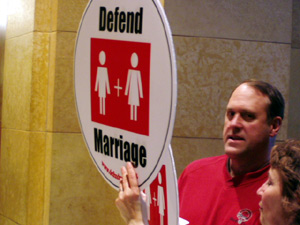April 1, 2005
 |
| Supporters of the bill calling for a vote on a constitutional amendment defining marriage demonstrated outside House chambers. (MPR Photo/Michael Khoo) |
St. Paul, Minn. — After more than three hours of often emotional debate, the House voted 77-to-56 in favor of putting the proposed amendment to Minnesota voters.
Republican Dan Severson of Sauk Rapids is the chief sponsor of the measure. Even though Minnesota law already prohibits same-sex marriages, Severson says courts in other states have overturned similar prohibitions. He says only a constitutional amendment has the power to remove the issue from the judicial system.
"This amendment is about defining marriage between one man and one woman. This amendment is about allowing the people to make a vote on that particular amendment. And this amendment is about short-circuiting judicial activism," he said.
Thirteen Democrats voted with 64 Republicans in support of the measure. Opposing it were 53 DFLers and three Republicans.
Democrat Karen Clark of Minneapolis, one of only two openly gay legislators, says marriage offers important legal rights and protections, including access to insurance benefits, survivor benefits, hospital visitation rights, and joint parenting privileges.
"And there's nothing that you do here that's going to stop people from coming together and forming our loving unions. What you may be able to do by what you're doing here is to deny us equal access to the same kind of benefits that other loving unions have under the mantle of marriage," she said.
The amendment specifically rules out giving gay and lesbian couples access to the "legal equivalent" of marriage. That, says Clark, means civil unions would be off the table and possibly domestic partner benefits for public employees, including those at the University of Minnesota.
Severson declined to say what affect the language would have on those alternatives to marriage. DFLer Michael Paymer of St. Paul says the same-sex marriage issue has been used to divide constitutencies.
"They're going to vote not out of conviction, not because they believe that this is the right thing to do, but because of politics and how this might get used against them in the next election. I understand that. But it saddens me," he said.
Outside the House chamber, several demonstrators on both sides of the issue gathered to watch the debate unfold. Cathy Max of Minneapolis says she supports the amendment. She says societies have the right to curb behavior that they find objectionable.
"To redefine who and what we are so that someone else can have a similar -- what they consider -- "right" is not giving a freedom, it's trying to change who and what we are," Max said.
Doug Benson of Robbinsdale says he and his same-sex partner have a marriage license from Ontario, Canada, and would like to see it recognized in Minnesota. He argues that the state has no to deny couples certain privileges based solely on sexual orientation.
"It's a civil contract; it has nothing to do with religion whatsoever. And it should be available to all couples that want to get married," he said.
Benson says he'd like to see the current state law barring same-sex marriages thrown out or repealed, but that he doesn't have the resources to bring legal action. The possibility that a gay or lesbian couple may one day initiate a lawsuit is a prime motivator for supporters of the ban.
Republican Michelle Bachmann of Stillwater is the chief Senate sponsor. She says a string of constitutional bans passed in states across the nation last year, indicating broad popular support.
"Now we saw a political tsunami of sorts occur last November," she said. "Eleven state ballot initiatives that clearly stated overwhelming public support for retaining the definition of marriage as one man, one woman."
The proposal never made it to the Senate floor last year for an up-or-down vote. Bachmann blames DFL leaders for bottling the bill up in the committee process, even though she says a majority of senators agree with her. She says she hopes public pressure will change that this year.






